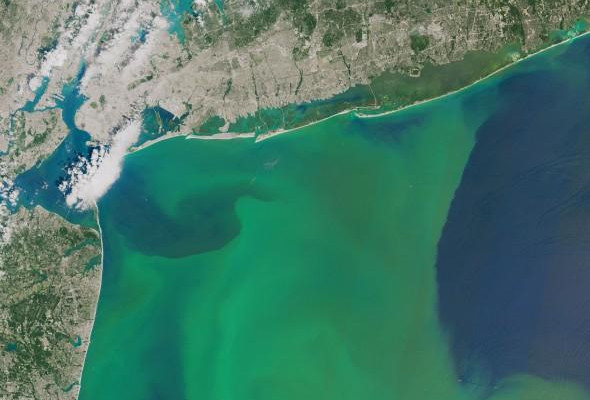11 Dec 2024

Tired Earth
By The Editorial Board

If climate change continues to progress, increased precipitation could mean detrimental outcomes for water quality in the United States, a major new study warns.
An intensifying water cycle can substantially overload waterways with excess nitrogen runoff—which could near 20 percent by 2100—and increase the likelihood of events that severely impair water quality, according to a new study published by Science.
When rainfall washes nitrogen and phosphorus from human activities like agriculture and fossil fuel combustion into rivers and lakes, those waterways are overloaded with nutrients, and a phenomenon called "eutrophication” occurs.
This can be dangerous for both people and animals. Toxic algal blooms can develop, as well as harmful low-oxygen dead zones known as hypoxia, which can cause negative impacts on human health, aquatic ecosystems, and the economy. Notable dead zones include those in the Gulf of Mexico, the Chesapeake Bay, and around Florida.
In the new study, researchers predict how climate change might increase eutrophication and threats to water resources by using projections from 21 different climate models, each of which was run for three climate scenarios and two different time periods (near future, 2031-2060, and far-future, 2071-2100).
Previous models have consistently estimated that nitrogen loading will increase under all three scenarios and for both time periods. But under a far-future “business-as-usual” scenario, meaning a situation in which current warming rates continue into the future, the projected increase in nitrogen loading within the continental United States is highest.
Under these conditions, the study states that changes in the climate would alter precipitation patterns in the U.S. and increase nutrient pollution by one-fifth by the end of the century, with the strongest impacts occurring in the Corn Belt and in the Northeast.
Although some argue that the business-as-usual isn’t likely, Anna Michalak, a researcher at the Carnegie Institution for Science and co-author of the study, says it’s not as unrealistic as it might seem.
“If we look at the trajectory we’re currently on, it looks very much like the business-as-usual scenario,” Michalak says. “I would love for that to be unrealistic and for that pathway to be wrong, but it’s not unrealistic to think that unless we start getting much more serious about mitigating and managing climate change, this is the path we are essentially on.”
By increasing efforts to cut greenhouse gas emissions and slow down the progression of climate change, these situations could avoided, however.
CLEANING UP THE MESS?
An increase in precipitation is an expected outcome of climate change, and other scientists have recently reported that a warming atmosphere will hold more water and produce much heavier rains over the course of the century.
"Future climate projections are showing an overall drying of the U.S. Southwest and a wetting in the rest of the country, with some seasonal differences," says Andreas Prein, a scientist at the National Center for Atmospheric Research.
More rainfall from extreme events is expected in the future climate, Prein added, meaning that extreme precipitation is expected to increase, even in some regions that show a drying trend on average.
Still, preventing the resulting increases in excess nitrogen runoff is a major task. Researchers report that a one-third reduction in overall nitrogen input such as fertilizer use would be necessary, and management in the affected regions alone will not be enough.
The U.S. Environmental Protection Agency currently recommends reducing nitrogen input in the Mississippi Atchafalaya River Basin by 20 percent relative to 1980-1996 levels to mitigate the negative effects of nitrogen that flows into the Gulf of Mexico.
However, with the estimated changes in precipitation, a 62 percent reduction in nitrogen input would be required to achieve a similar objective.
This could be a problem for communities across the country in the future where it’s critical to start thinking about updating their infrastructure to deal with a future uptick in extreme storms.
“In developing water quality management strategies, we need to be accounting for the fact that precipitation is going to change and that water quality is not only a local issue,” Michalak says. “We need to take a step back and realize that what we see in our backyards in terms of water quality is human action locally, regionally, and globally.”
GLOBAL IMPACT
Although the researchers’ model is specific to the U.S., other heavily affected areas were also identified in the study, including India, China, and Southeast Asia. Because these regions are fast developing with continually growing populations, they have higher risk for large increases in nitrogen pollution due to increased precipitation.
Michalak said large population centers around the world are already displaying evidence of hypoxic dead zones and harmful algae blooms.
It’s a global issue, she said, and by using the new analysis of the U.S., researchers are opening a window to look at other parts of the world where high precipitation is expected to increase even more, and where nitrogen application is high.
“Water serves a lot of purposes, and even if you don’t live near the water, it does affect you, the things you eat and the way you live,” Michalak says. “It’s very, very crucial to understand that water sustainability is not just about having enough water, but it’s also about whether that water can be used by people and animals in safe, healthy ways.”
Source : news.nationalgeographic.com
Comment